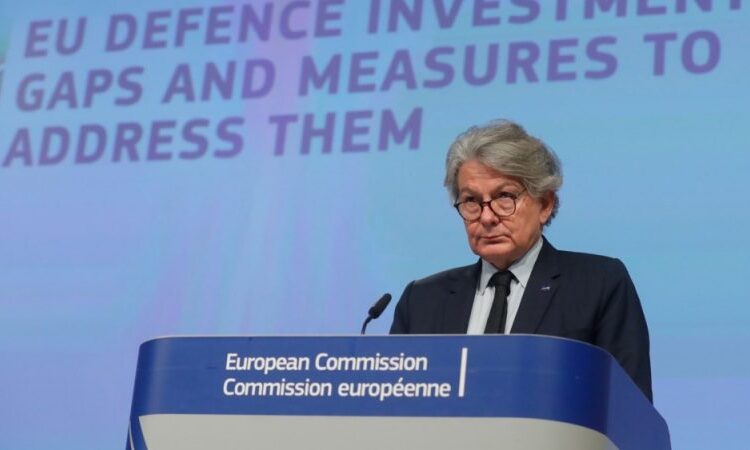
The European Commission plans to propose a new ‘European Defence Production Act’ to boost the bloc’s defence industrial base, from research to joint procurement, to help EU member states better face future crises.
Russia’s war in Ukraine has forced EU member states to reflect on the shortcomings of the bloc’s defence industry production capacities and how to answer their urgent needs for defence equipment.
“We need a programme to consolidate and expand support for European industry, but also to potentially establish a regulatory framework that can be activated to support defence production when needed – a kind of European-style Defence Production Act,” a senior Commission official told EURACTIV.
The proposed scheme echoes the US Defense Production Act, under which the US president can expedite and expand the supply of materials and services from the US industrial base needed to promote national defence.
For defence officials, the war has also showcased the usefulness of conventional war defence equipment, such as tanks, ammunition or surface-to-air missiles, at the EU’s borders and the need for companies to be able to deliver those quickly if required.
EURACTIV understands the idea was first floated at an informal meeting of EU defence ministers in Toledo, Spain, last week and is likely to feature in the European Commission President Ursula von der Leyen’s final State of the Union (SOTEU) speech next Wednesday (13 September) in Strasbourg.
Regulatory waivers time
The EU’s new defence act could, therefore, be a permanent framework aiming to support the full process of defence production in case of urgent needs.
One EU diplomat said it could be based on the short-term frameworks of the European defence industry reinforcement through common procurement (EDIRPA) fund to incentivise joint procurement and the EU’s ability to ramp up ammunition production capacities (ASAP).
In addition, it could propose regulatory waivers initially included in the European Commission’s proposal before the summer.
However, EU member states postponed the negotiations on those for lack of time and agreement on the priority-related orders, mapping of production capacities and export licence waivers.
Regulations to give the European Commission and member states the power to dictate and know of industries’ production capacities of critical products have been proposed in texts already tabled during von der Leyen’s mandate, as the dangerous lack of masks and ventilators during the COVID-19 pandemic remained on everyone’s minds.
But they have faced a wall once in the hands of the member states in establishing the Single Market Emergency Instrument (SMEI) or the Chips Act, wary of stepping on private businesses’ toes.
In the case of the United States, the Act was invoked during the COVID-19 pandemic to increase the production of critical medical supplies and regularly on defence-related equipment.
Try again, Commission
Although the EU executive is planning to present a text by the “end of the year” 2023, the same senior official also said, “that will mean finding the right resources” to do so.
The COVID-19 pandemic and the war in Ukraine have hit the EU budget hard. The EU executive proposed a mid-term review in June for €66 billion top-up that does not foresee a Defence Production Act for defence.
It is unclear how this act will work with the European Commission’s plans to propose a new European Defence Investment Programme (EDIP), which was initially billed to propose a VAT exemption but was postponed to a later stage.
The institution’s representative said EDIP would be a pillar of “European defence in the long term”.
They also mentioned the European Defence Fund, which finances technology research and development, and the Peace facility, to finance member states and European deliveries of lethal and non-lethal equipment to third countries.
[Edited by Alice Taylor]







